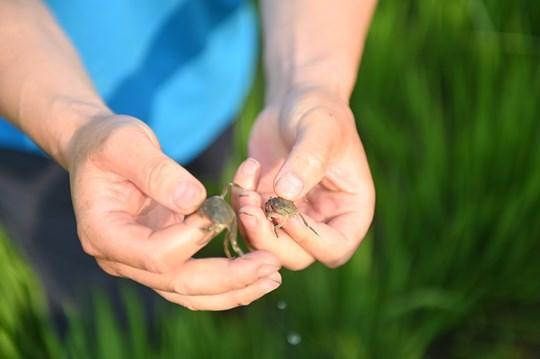"Raising crabs in rice fields, rice and crabs coexist, so that an acre of rice fields can double the profit!" In the midsummer season, 55-year-old Li Xiaodong observed the growth of river crabs in the rice fields, and said with anticipation that in two months, This paddy field is about to usher in a "double" harvest of rice and river crabs.
China News Service reported that Li Xiaodong's hometown of Panjin, Liaoning, is located at the mouth of the Liaohe and Daliaohe rivers. In ancient times, river crabs were rich in river crabs. There was a proverb of "beating pheasants and scooping fish, and crabs crawling into the rice pot", as well as "Tang Wang Zhengdong crabs." The beautiful legend of building a bridge.
Today, Panjin is well-known both at home and abroad for its crystal clear rice and full-fat cream of crabs. It is known as the "Hometown of Ecological Rice in China", "Grain City in North China" and "The First City of River Crabs in China". model.
According to Li Xiaodong, in the 1980s and 1990s, due to development and construction blocking the migration channel of river crabs, the local natural river crab resources plummeted and the price of crabs soared.
In 1990, Li Xiaodong, as the production technology director of the Dawa County Fisheries Bureau of Panjin, took the initiative to invite Ying to set up a river crab development and breeding station, and used a 300 cubic water sports seedling room to start a research on the industrialized artificial seedling technology of river crabs. After more than three months of hard work, he broke through the technical difficulties of artificial breeding of river crabs and found a direction for the development of the local river crab industry.

The picture shows on July 16th, the staff displayed the crabs that had just grown for one year in the experimental field in Panjin, Liaoning Province. (Image source: China News Service)
The following spring, the crab fry was again productive, but there were problems with sales. Just when everyone was at a loss, Li Xiaodong had an idea: Can we breed crabs in the rice fields? In this way, both rice can be grown and river crabs can be raised, realizing "two harvests from one field", and farmers' income will also increase.
Since then, Li Xiaodong has started a life revolving around rice fields and crab ponds. After continuous attempts and efforts, rice field crab breeding has achieved great success, and it has truly achieved fat crabs and rice grains. As a result, Li Xiaodong became the "first person" to raise crabs in local rice fields, and Panjin also created a precedent for raising crabs in rice fields across the country.
This kind of rice-crab co-cultivation model realizes one-water dual-use, one-site double-harvest, and the rice-crabs mutually benefit each other. River crabs loosen soil, weeds, catch insects, and fertilize rice, while rice purifies the environment and provides shelter for river crabs. This model not only improves the quality of rice, but also makes the crabs more plump, making the farmland produce the best comprehensive benefits.
Today, the rice-crab co-cultivation model has formed a modern agricultural production and operation model of "industrial alliance + base + farmers" in Panjin, driving more than 10,000 farmers to increase their income and become rich. As of 2019, the Panjin Rice Alliance has an annual sales of 700,000 tons of rice and a sales income of 5 billion yuan; the river crab breeding area is 1.705 million mu, the output is 75,000 tons, and the industrial output value is 11.5 billion yuan (RMB, the same below).
Panjin also regards the vigorous development of the crab industry as the foothold and foothold to increase the income of local farmers, and constantly updates its concepts. ", to upgrade "crab hegemony" to "crab culture".
"At that time, I thought about putting crab seedlings in the fields, so I would raise them. I didn't expect that it would have such a big impact on the whole country and promote the development of the entire industry." At first, raising crabs in rice fields was just an accidental idea of Li Xiaodong. . Today, this model has been practiced and developed in Panjin for more than 30 years, and has been popularized throughout the country, accumulatively increasing the income of Chinese farmers by more than 50 billion yuan.